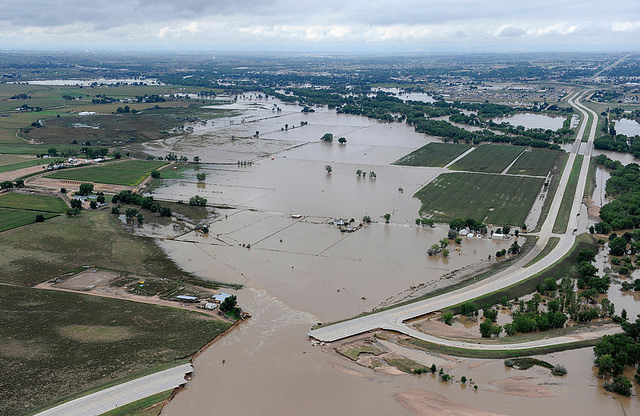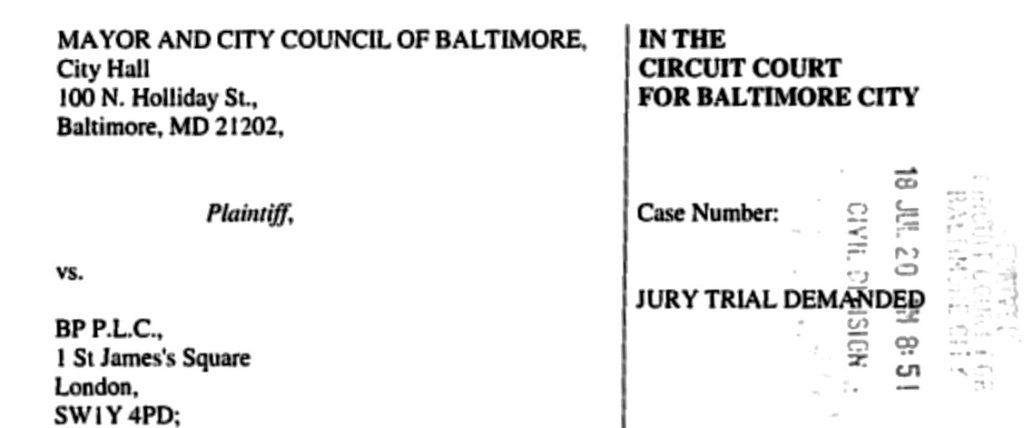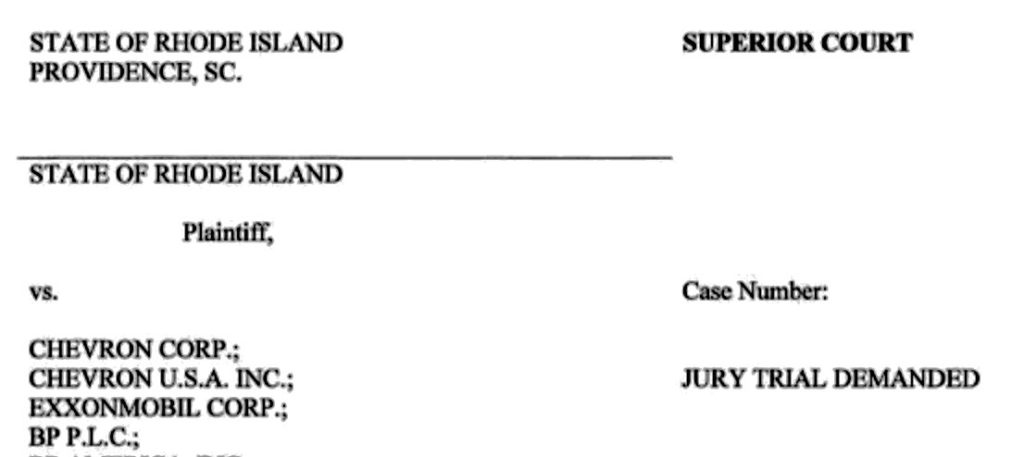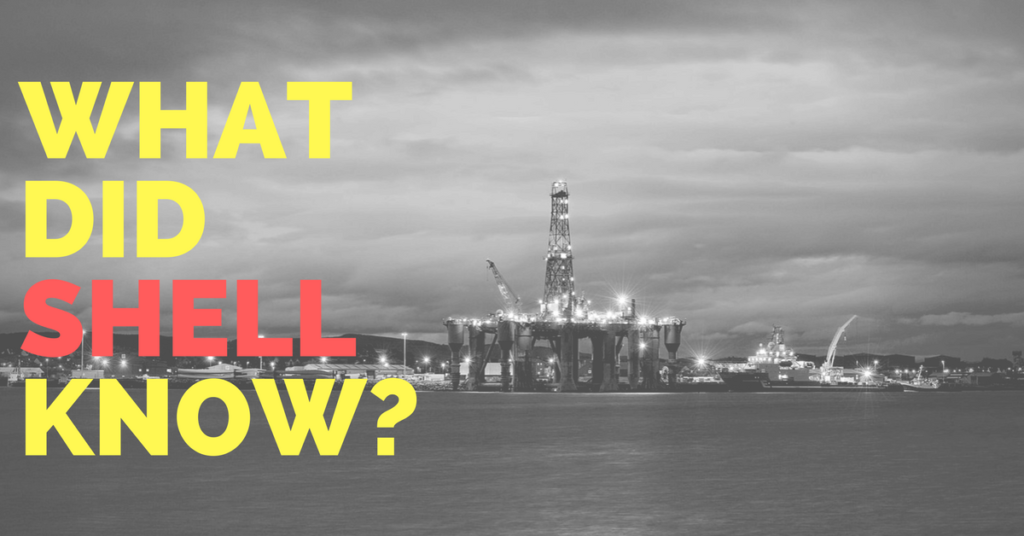Since Climate Investigation Center’s last climate liability update there have been multiple developments, some favorable to plaintiffs, others less so. As the legal battles progress, CIC continues to uncover and curate primary documents on its Climate Files portal. In the last two months, we’ve added documents to our Exxon, Shell, and trade association collections that further illuminate industry’s role in climate denial and regulatory delay.
I. Documents In Action: Legal Landscape
The State of Rhode Island and the City of Baltimore filed their complaints on July 2nd and 20th respectively (embedded below). As we highlighted in May, evidence of industry-led climate change denial is central to these lawsuits. Both complaints include documents surfaced by CIC, including ExxonSecrets research, the Royal Dutch Shell collection, our Willie Soon investigation, and newly released API and Exxon documents. And the findings from the 2015 InsideClimate News and Columbia University Journalism School-L.A. Times investigations continue to support the plaintiffs’ claims. As the complaints continue to cite newly released documents, the discovery of this history is crucial to the success of these cases.
While the last two months brought two new cases, two were also dismissed (in New York City and Oakland). Both litigation teams plan to appeal. Meanwhile, the County of Boulder amended its complaint to add a conspiracy charge and in Juliana v. U.S. (“Our Children’s Trust”) the Supreme Court raised justiciability concerns while ultimately denying the government’s request to halt discovery.
Baltimore Complaint
Rhode Island Complaint
II. New to Climate Files
The following nine documents were published from 1980 to 2001. The full documents are hosted on Climate Files, along with the greater collection.
Exxon Documents
1996 Exxon’s Brian Flannery speech on “Global Climate Change”
Previously unavailable to the public, this 1996 speech was uncovered by the efforts of investigative reporter Jelmer Mommers of De Correspondent. The speech demonstrates the degree of influence that Exxon’s staff exerted over the U.N. Intergovernmental Panel on Climate Change (IPCC).
The speaker, Brian Flannery, is a model case study for Exxon’s decades-long effort to obfuscate climate science, including its own. Flannery began his work for Exxon as Scientific Adviser for Research and Engineering in 1980. In 1998, ExxonMobil promoted Flannery from a source of science to the face of it, giving him the title of Manager of Science, Strategy and Policy.
In this document, Flannery is “on message,” supporting the use of fossil fuels and questioning the legitimacy of climate science while highlighting the importance of his own scientific contributions. “As for the longer term,” Flannery concludes, “at this point it is too soon to be taking hard and fast decisions about the climate change … flexibility should be the hallmark.”
1985 Exxon Presentation on Greenhouse Effect Research and Budget
This 1985 presentation by Brian Flannery is a part of InsideClimate News’ larger collection. When compared to the above speech, it’s clear that Exxon’s position on climate change evolved in a direction that would maintain the status quo.
While Flannery is dismissive of climate science in 1996, his 1985 modeling shows the relationship between CO2 and climate change and the net effect on global temperature. Then too, Flannery emphasized the need for further understanding and posited the ocean could absorb some CO2, lessening future climate impact.
1998 Mobil CEO Lou Noto remarks on “two sided attitude toward climate”
This video and transcript reflects Mobil Corporation CEO and Chairman Lucio “Lou” Noto’s remarks at a February 1998 Employee Forum. Released by ThinkProgress in April 2018, this speech shows Mobil’s awareness of climate change and its relationship to its products. Defending Mobil’s “two-sided attitude toward climate,” Noto maligns the Kyoto Protocol and “mandatory” regulatory measures to curb greenhouse gas emissions.
Noto also details the creation of a greenhouse gas “inventory” for the company’s emissions. Their accounting determined that the emissions from its facilities represent “probably only 5 percent of the issue in Mobil’s case. Our customers using our products probably account for 95 percent of those emissions. But with the 5 percent that we’re responsible for, we’re doing an inventory.” This is a rare admission by an oil executive in regards to the downstream impact of their products – used as directed.
Mobil and Exxon announced their intent to merge in December 1998.
1980 Internal Exxon Memorandum: Greenhouse Program
This is a 1980 internal memorandum from Exxon Research and Engineering’s Harold Weinberg to Henry Shaw and N. Richard Werthamer about Exxon’s CO2 research initiative, the “Greenhouse Program.” Shaw was a manager of the Environmental Area in Exxon Research & Engineering and an early advocate for the company’s research of atmospheric CO2.
Just one item in a series of memos from this time period in the Climate Files collection, this document shows that internal CO2 research was not taken lightly by Exxon; rather, it was important enough to be funded and debated by senior employees in the company.
Shell Documents
More Royal Dutch Shell documents surfaced since April, adding further context to Shell’s involvement in shaping climate policy.
1996 IPIECA Report on Framework Convention on Climate Change (COP2)
This is a 1996 report on the Framework Convention on Climate Change (COP2) for the members of the International Petroleum Industry Environmental Conservation Association (IPIECA). IPIECA was formed in 1974 and served as the primary communication channel between the oil and gas industry and the United Nations Framework Convention on Climate Change (UNFCCC) after it was formed in 1992.
COP2 was attended by a wide range of oil industry representatives (including Brian Flannery). This document acknowledges the IPCC’s declaration at the conference that rising greenhouse gases “will lead to dangerous interference with the climate system, given the serious risk of an increase in temperature.”
The document also mentions the specific role and influence of IPIECA at COP2; in addition to attending the conference as observers, IPIECA held a Technology Cooperation Meeting and contributed to the IPCC Informal Workshop on Technology Assessment. The memo states: “the IPIECA input to IPCC on this issue was evident in the draft and indeed Bob Watson [IPCC chairperson] acknowledged the IPIECA contribution as a major source.”
Shell’s 1999 “Sustainable Development – making it happen” report and supplemental materials provide an inside look at how Shell reckoned with issues of profitability, sustainable development, and public perception.
Following a far-reaching bribery scandal in Nigeria, the Brent Spar debacle, and the death of activist Ken Saro-Wiwa, Shell launched a highly publicized rebranding campaign hoping to integrate a “commitment to the principles of sustainable development, [while] balancing [its] own legitimate commercial interests with the wider need to protect and enhance the environment and contribute to social progress and stability.”
As an example of sustainable development principles in practice, the report looks at Shell’s Malampaya pipeline project in the Philippines, undertaken in the late 1990s, as one that “shows the way for social approval.” The report emphasizes the importance of curating social acceptability for the pipeline project in the face of a long list of environmental concerns raised by community members that “could affect their source of livelihood.” After community engagement, Shell was able to bring the pipeline online, concluding: “From Shell’s point of view, life does look brighter for more Filipinos.”
The document also includes a response from the staff’s “sounding board” in which they were polled on their understanding and investment in sustainable development. Notably, the graphs demonstrate that more than half of respondents disagree or strongly disagree that the report effectively made the case for Sustainable Development; separately, 33% of Shell “Corporate” and 11% of the “Operating Company” understood sustainable development less than before reading the report.
Trade Association Documents
This document is the product of a 2002 FOIA filed by Greenpeace. The briefing details talking points and background information on the Global Climate Coalition (GCC), a US-based industry group that opposed action to reduce greenhouse gas emissions and promoted the views of climate skeptics. Representatives from the GCC were scheduled to meet Under Secretary of State for Global Affairs Paula Dobriansky.
The document shows the government’s interest to “solicit views” from GCC, highlighting that “POTUS rejected Kyoto, in part, based on input from you.” The memo also seeks the opinions of GCC members on their views of acceptable climate governance: “interested in hearing from you, what type of international alternatives to Kyoto would you support?”
1997 E&P Forum Position Paper on Sustainable Development in Oil and Gas Industry
This document is a position paper on sustainable development in the oil and gas industry, written by the Sustainable Development Task Force of the Oil Industry International Exploration and Production Forum (E&P Forum), which became the International Association of Oil and Gas Producers (IOGP) in 1999.
The Forum takes issue with the “narrow” interpretation that views oil and gas as “incompatible with sustainable development because of concern about its environmental consequences.” The authors of the paper, all of whom represent oil and gas companies, write about the need for society to “build consensus about current needs and future options,” arguing that “the oil and gas industry is an essential participant” in the process of sustainable development.
1995 Society of Petroleum Engineers Paper on Securing the Future
This paper, “Securing the Future – in Partnership with the Environment” was selected by a program committee of the Society for Petroleum Engineers for presentation at the Offshore Europe 1995 Conference and Exhibition.
In the section on sustainable development, the author (A.L. Smith) writes: “we do not have time to wait until disaster overwhelms us before we make the radical changes necessary to protect our world for future generations. A sense of urgency as well as a realisation of the need for global involvement is essential, otherwise all the oil and gas industries best efforts will be undermined by those who refuse to shoulder their proper burdens.” Smith concludes: “As an industry we must be dedicated to continuous efforts to improve the compatibility of our operations with the environment while economically supplying the highest quality products and services to our customers.”




